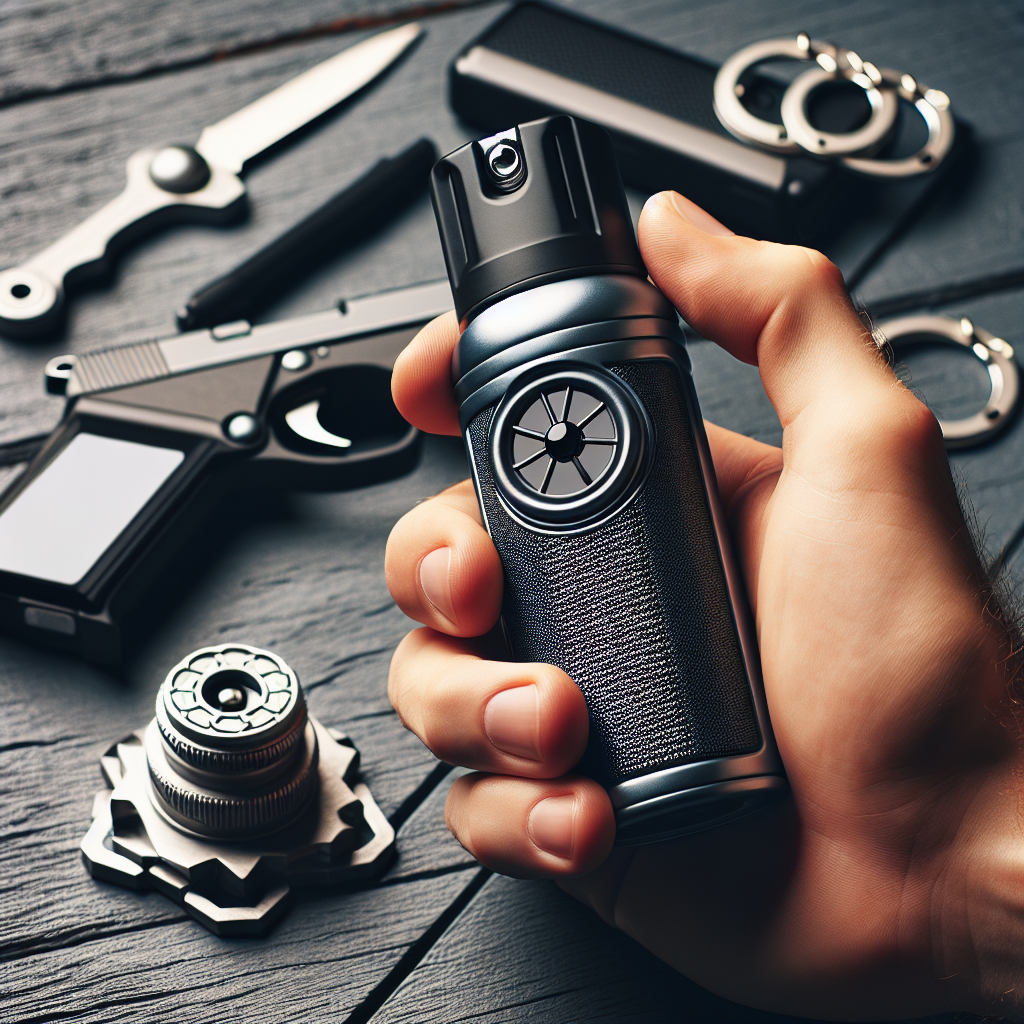Are you planning your next adventure abroad? Whether you’re embarking on a solo backpacking trip or heading to a foreign city for business, it’s crucial to prioritize your safety. In this article, we’ll explore practical self-defense techniques and strategies that can empower you to feel more secure while traveling. From basic personal safety tips to learning key maneuvers, you’ll discover valuable insights to help protect yourself on the go. So grab your passport and get ready to embark on your journey with confidence.

General Safety Tips
Stay Aware of Your Surroundings
When you’re traveling, it’s important to stay aware of your surroundings at all times. Take note of the people around you, potential escape routes, and any suspicious activities. By being attentive, you can quickly assess any potential risks and take appropriate action to keep yourself safe.
Trust Your Gut
One of the most powerful tools you have to protect yourself is your intuition. If something feels off or makes you uncomfortable, trust your gut instincts. It’s better to err on the side of caution and avoid situations or individuals that give you a bad vibe.
Plan Your Routes in Advance
Before heading out, plan your routes in advance, especially if you’re traveling to an unfamiliar destination. Use reliable GPS navigation apps or maps to help you navigate your way and avoid getting lost. Being organized and knowing your routes will help you stay more confident and reduce the chances of ending up in unsafe areas.
Preparation Before Travel
Research Your Destination
Before traveling to a new place, it’s essential to do thorough research about your destination. Familiarize yourself with local customs, laws, and potential safety concerns. Understand the layout of the area, including any high-crime areas to avoid. The more knowledge you have about your destination, the better prepared you’ll be to navigate safely.
Share Itinerary with Someone Trusted
Always share your travel itinerary with a trusted friend or family member. Provide them with details of your flights, accommodations, and any planned activities. In case of an emergency, they will know where to find you or who to contact. This can provide peace of mind for both you and your loved ones.
Learn Basic Self-Defense Moves
Taking the time to learn basic self-defense moves before your trip can greatly enhance your personal safety. Look for local self-defense classes or online tutorials that teach simple techniques to protect yourself in case of an attack. Acquiring these skills will not only boost your confidence but also provide you with the tools to defend yourself if necessary.
Pack Wisely
Carry Pepper Spray or Personal Alarm
Pack pepper spray or a personal alarm in your bag or pocket for added security. These non-lethal tools can provide a momentary advantage and help you distract or deter potential attackers. Make sure to check the rules and regulations regarding carrying such items in your destination, as they may be restricted or require specific permits.
Avoid Flashy Jewelry or Valuables
While traveling, it’s advisable to leave your flashy jewelry and expensive valuables at home. Wearing flashy items can attract unwanted attention and make you a target for theft or robbery. Opt for minimalistic accessories to blend in with the local crowd and reduce the risk of becoming a victim of crime.
Keep Valuables Locked in Your Accommodation
When you’re out exploring, make sure to lock up your valuables in your accommodation. Use the in-room safe if available or consult with the hotel staff about secure storage options. Leaving your valuable items unattended in a hotel room can make them an easy target for theft. By taking precautionary measures, you can enjoy your travels without unnecessary worry.
Safe Accommodation
Choose Secure Accommodations
When selecting accommodations, prioritize safety features. Look for hotels, hostels, or guesthouses that have visible security measures such as surveillance cameras, secure entrances, and well-lit common areas. Reviews from other travelers can also provide insight into the safety of different accommodations.
Lock the Doors and Windows
Always lock the doors and windows of your accommodation, even if you’re just stepping out for a few minutes. This simple step can deter potential intruders and prevent unauthorized access. Make it a habit to double-check the security of your room before leaving and at night before going to bed.
Use Hotel Safes for Valuables
If your accommodation provides a safe in the room or at the front desk, use it to store your valuables. Items like passports, extra cash, and expensive electronics should be kept secure and out of sight when you’re not using them. By utilizing these safes, you can minimize the risk of theft and enjoy peace of mind during your travels.

Transportation Safety
Choose Reliable Transportation Options
When it comes to transportation, choose reliable and reputable services. Research the local transportation options and opt for well-known companies or licensed drivers. If using ride-sharing services, verify the driver’s identity and make note of the vehicle’s license plate number before getting in. Prioritizing safety when it comes to transportation is crucial for avoiding scams or dangerous situations.
Be Vigilant on Public Transportation
When using public transportation, remain vigilant and keep an eye on your surroundings. Avoid displaying valuable items, such as smartphones or wallets, that may attract unwanted attention. Stay alert for any suspicious behavior and be prepared to change your seat or exit the vehicle if necessary. Don’t hesitate to alert the authorities or seek assistance if you feel unsafe.
Check for Licensed Taxis
If you decide to take a taxi, always make sure it is a licensed one. Check for official signage, license plates, and identification badges displayed by the driver. Avoid unmarked or unofficial taxis, as they may not have undergone the necessary safety checks and could pose a risk.
Stay Connected
Have Emergency Contacts Saved in Your Phone
Before beginning your journey, save important emergency contacts in your phone. This includes the local police, embassy or consulate, as well as the contact information of someone back home who can assist you in case of an emergency. Having these numbers readily available can save precious time if you find yourself in a potentially dangerous situation.
Use Maps and GPS Navigation
Make use of maps and GPS navigation apps to stay on track and avoid getting lost. By knowing your surroundings and having a clear sense of direction, you can minimize the chances of inadvertently wandering into unsafe areas. Be cautious when using your phone in public and keep a firm grip on it to prevent theft.
Familiarize Yourself with Local Emergency Services
Take the time to familiarize yourself with the local emergency services in your destination. Learn the emergency hotline numbers, the location of the nearest hospital, and other relevant services. Being prepared and having this information readily available can be crucial in times of crisis.

Out and About
Walk with Confidence
When exploring a new destination, walk with confidence and purpose. Maintain good posture, keep your head up, and make eye contact with those around you. Exuding confidence can deter potential criminals and make you a less appealing target. It’s also a good idea to research and understand the local cultural norms regarding personal space and interaction.
Avoid Isolated Areas
Wherever you are, it’s best to avoid isolated areas, especially at night. Stick to well-lit, populated areas and main streets. Criminals are less likely to target individuals in busy areas, as there are more witnesses. If you need to walk alone at night, consider using a trusted ride-sharing service or having a friend accompany you.
Be Cautious of Strangers
While it’s natural to meet new people while traveling, exercise caution when interacting with strangers. Be wary of individuals who seem overly friendly or intrusive, and avoid sharing personal information with people you’ve just met. Trust your instincts and remember that it’s perfectly acceptable to decline invitations or requests if they make you uncomfortable.
Self-Defense Tools and Techniques
Take Self-Defense Classes
Taking self-defense classes before your trip can be a valuable investment in your personal safety. These classes will teach you techniques to defend yourself and give you the confidence to react effectively in difficult situations. Look for local classes or online resources that specifically cater to travelers.
Carry a Whistle or Personal Safety Alarm
A whistle or personal safety alarm can be an effective tool to attract attention and deter potential attackers. These small devices are easy to carry and can be activated quickly. In case of an emergency, using a whistle or personal safety alarm can help draw attention to your situation and bring assistance your way.
Learn Basic Escape Techniques
Learning basic escape techniques can empower you to free yourself in dangerous situations. Techniques such as wrist releases, grabs, and chokehold defense can give you an advantage and allow you to create distance between yourself and an attacker. Practice these techniques regularly to build muscle memory and increase your chances of successfully escaping a threatening situation.
Dealing with Confrontation
Stay Calm and Confident
If you find yourself in a confrontation, it’s important to stay calm and composed. Take deep breaths, control your emotions, and maintain a confident demeanor. Remember that confidence can be a deterrent to potential attackers, as they may be less likely to target someone who appears strong and in control.
Assertive Communication
Assertive communication is key when dealing with confrontations. Clearly and firmly express your boundaries and refuse to engage in any form of verbal or physical aggression. Use a strong and calm voice to assert yourself and convey that you will not tolerate any intimidation or harm.
Create Distance and Remove Yourself from the Situation
If possible, create distance between yourself and the person or situation that is making you uncomfortable. Move towards a well-populated area, seek assistance from bystanders or authorities, or go to a nearby establishment where you can find safety. Removing yourself from the situation is often the best course of action to ensure your well-being.
Emergency Situations
Know Emergency Exits at Your Accommodations
Upon checking in to your accommodation, familiarize yourself with the emergency exits. Locate the nearest exit to your room and review the evacuation procedures. In case of an emergency, this knowledge will enable you to quickly and safely evacuate the building.
Create a Safety Plan
Before your trip, create a safety plan outlining steps to take in different emergency scenarios. Include information on what to do in case of natural disasters, medical emergencies, or civil unrest. Share this plan with your trusted contact back home and ensure that you have access to it at all times.
Contact Local Authorities in Case of Emergency
In the event of an emergency, contact the local authorities immediately. Use the local emergency hotline or seek assistance from hotel staff, local police, or other emergency services. They are trained to handle various situations and can provide the necessary assistance or guidance during challenging times.
By following these general safety tips and implementing the necessary precautions, you can enhance your personal safety while traveling. Remember to trust your instincts, be prepared, and stay aware of your surroundings. With the right mindset and proactive measures, you can enjoy your journey with confidence and peace of mind.






